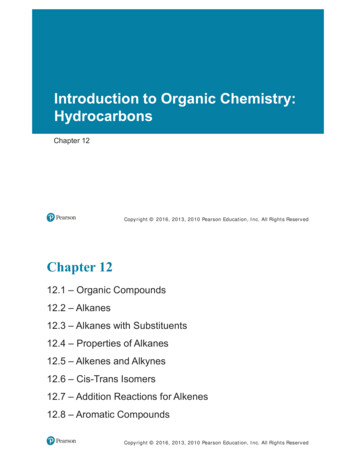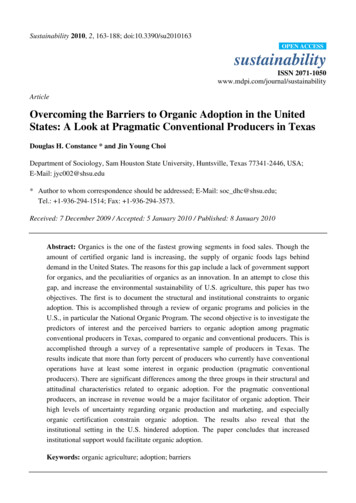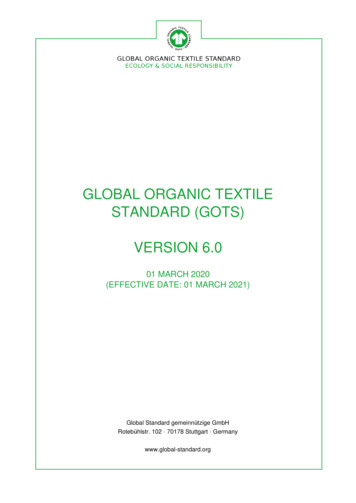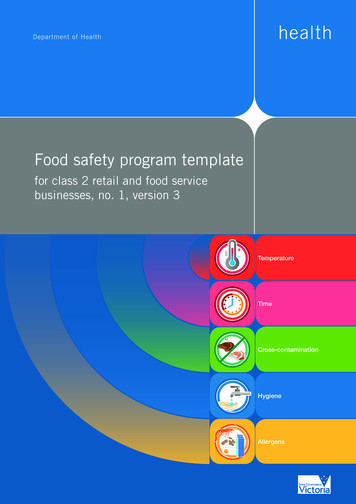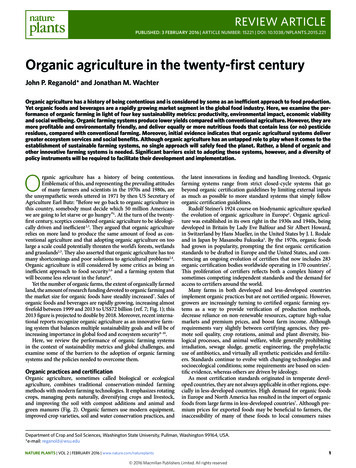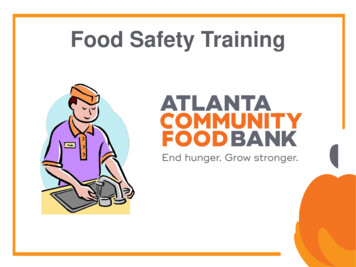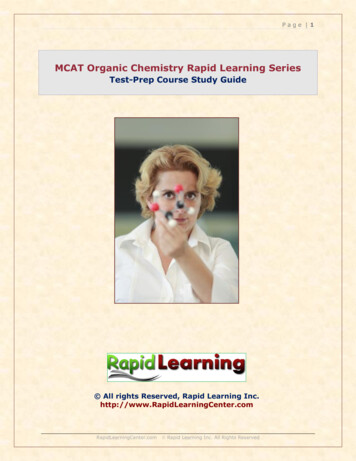
Transcription
Food Safety and the Organic Inspectorby Bob Durst and Margaret ScolesFood Safety in Organic Operations came to the forefront of North American news inJanuary with the investigation and subsequent closing of the Peanut Corporation ofAmerica (PCA) [full article, last issue, Vol. 18 N1]. The expanded PCA recall includedsome organic peanut products, although no organic products had been implicated in any ofthe illnesses or deaths. With the May 7 seizure of 1.5 million worth of ingredients inTennessee on behalf of the Food and Drug Administration (FDA) at another certifiedorganic plant, it became even clearer that this problem is not going to disappear.No one wants organic food to be less safe than non-organic food. Organic operations mustcomply with all relevant health and safety requirements just like conventional processorsdo. Operations that do not fully comply with 205.271 and 205.272, GMP's and SSOP's putorganic integrity at risk, which we all must be vigilant to prevent.When operations fail publicly, the search begins for someone to blame. Was it the organic certifier’s fault for certifying a processing plant that didn’t comply withbasic health requirements? In the instances mentioned above, three different certifiers wereinvolved. That is an indication that the problem is possibly systemic and almost certainlynot isolated or rare. Were these cases of fraud, where records were knowingly hidden from health or organicinspectors? We haven't been given enough information to know. Was it negligence that proper registration with appropriate state or local agencies had notbeen done? We don't know. Was an accreditor at fault for accrediting the certifiers? Not likely. Was the inspector at fault for failing to inspect thoroughly or report findings properly?Again, we don't know, although apparently at least one inspector was fired.There is no value to placing blame. We (the organic industry) are under 'fire' and need topull together to put the 'fire' out and see that it isn't allowed to flare up again.Organic inspectors are keenly aware that they are on-site only one day per year in mostcases. The inspection is a single snapshot in time. Inspectors are also bound by limitationsof confidentiality; we report only to the certifier. Reporting to outside authorities wouldviolate confidentiality, not to mention jeopardize their opportunities for inspection work.Sometimes inspectors see and report things that are not followed up on by the certifier asone might expect. The organic inspector’s position, whether as contractor or employer, isnot without risk. A few examples:(1) Inspectors are asked to do inspections at times of year that do not make sense forverifying pest management compliance (such as winter when the weather has eliminatedmost pests);(2) Many certified operations do a very small percentage of their volume as organic, andmay be inspected when no organic product is present or in-process. This sometimes makesit impossible to verify some aspects of the OSP;(3) Sometimes it isn’t feasible to inspect while a processing plant is in operation. Due to theseasonality of crops, some sections or processing lines may not be in operation at the timeof inspection; then the annual renewal date makes it difficult to see the 'off-season' lines;(4) Certifiers sometimes specify the expected length of time to allot for an inspection.Setting a time limit can work against performing a quality inspection.Although these examples should be the exception rather than the rule, they all add anelement of difficulty for the organic inspector who is taking the snapshot one day out of365.On Feb. 25, Barbara Robinson, USDA Deputy Administrator and Acting Director of theNational Organic Program, issued a directive to certifiers. [See p. 8 for full text ofDirective.] The Directive instructed certifiers to take more responsibility for verifyingcompliance with appropriate health and safety regulations. In the wake of the Directive,certifiers began sending messages about the impact on the inspectors’ role. The approacheswere varied and raised concerns at IOIA on behalf of our members. Confusion bred alarmgiven the different interpretations being given by certifiers. [see Food Safety, page 22]Published by theInternational OrganicInspectors Association*Vol 18 No 2 Spring 2009*aka Independent Organic Inspectors Association
New Job MarketplaceCCOF has a new web feature – theInspection Marketplace.It’s a map and listing of potentiallyavailable CCOF inspections that arecurrently in their system but have not beenassigned to an inspector.CCOF is hoping that inspectors will checkit out periodically and offer to do work.Check it out phpJapan lifts restrictionson 2 of 3 inputsThe Japanese Ministry of AgricultureForestry and Fisheries has lifted the banson both Lignan Sulfonate and PotassiumBicarbonate in the production of organicproducts destined for Japan. The ban onalkali extracted hujmic acids is still ineffect.2009 Member DirectoryUpdatesPlease make the following changes toyour 2009 Membership Directory. Otherlisting info remains the same unless noted.Any additions or corrections toinformation categories other thanaddresses and contact numbers will belisted in the 2010 Hardcopy MembershipDirectory or can be viewed in the 2009Online Directory.Address Changes:INSPECTORS:Robert AlbeeEmail: purelyorganic@wildblue.netTom CassanEmail: cassan1@xplornet.comDavid DahmenEmail: organic4u@charter.netPre-Inoculated SeedOCIA recently discovered that some of theseed companies providing pre-inoculatedseeds (particularly those coated withNitragin Gold) are coating some seedswith prohibited synthetic coatings prior toinoculation. If you note anything aboutcoatings on the seed tags, let us know,and preferably, you should attach a copyof the seed tag to your inspection report.There are several seed coatings floatingaround. Bear in mind that not all NitraginGold inoculated seed is tainted with thiscoating.Kathy Fleming, OCIA Internationalkfleming@ocia.org402-477-2323 Ext. 311IOIA Board of DirectorsBob Durst, P.Ag . ChairGene Prochaska. Vice ChairStephen Bird. TreasurerEric Feutz. . SecretaryDavid Konrad.Director at LargeJulio Perez. First AlternateLidia Girón . Second AlternateThe Inspectors’ Report is the newsletterof the International Organic InspectorsAssociation. IOIA is a 501 (c)(3)educational organization, whose missionis to address issues and concernsrelevant to organic inspectors, to providequality inspector training and to promoteintegrity and consistency in the organiccertification process. Editor: DianeCooner, Box 1259, Guerneville, CA95446 USA.707-869-3017,fax 707-869-1478.ioiaweb@ioia.netDeadlinesare Feb 1, May 1,Aug 1 & Nov 1.Published quarterlyon recycled paper.THE INSPECTORS’ REPORT/SPRING 2009/PAGE 2Donna DoelP.O. Box 38Barnet, VT 05821Cell: 207.208.7433Christopher KidwellEmail: Christopher.kidwell@gmail.comWendy PaulsenHealing GardensPO Box 468Chicago City, MN 55013Cell: 651-332-6180Shelley ScheppBox 210Pond Inlet, NU X0A 0S0, CANADAHome: 867.899.8091Alex Moreno SotomayorEmail: amoreno@neb.rr.comJohn Trinterud1601 Skycrest #2Walnut Creek, CA 94595925.933.3015Erin (Beard) Wilson4375 Pierce Ave.Paullina, IA 51046Wendy ZiehlHome: 306.868.2244SUPPORTING MEMBERS:Osiris AbregoEmail: gypsyfarmer@yahoo.comAnne PlottoWork: 863.293.4133 ext 123Abed AnoutiWork: 520.305.3586Fax: 520.305.3587Welcome Returning Former Members[Not printed in the 2009 Directory]INSPECTOR MEMBERS:Peter KalogridisSUPPORTING MEMBERS:Northland Organic Foods Corp.495 Portland AvenueSt. Paul, MN 55102Work: 651.221.0855Fax: 651.221.0856Welcome New Members:INSPECTORS:Laura Kennedy2515 NW 38th Dr.Gainsville, FL 32605Home: 352.338.7575Work: 352.377.0133Email: lkennedy1984@gmail.comHéctor M. Pedraza2810 Industrial ParkwaySanta Maria, CA 93455UNITED STATESHome: 805.310.3129Work: 805.922.0055Fax: 805.352.1364Email: hpedraza@primuslabs.comWelcome New Supporting IndividualMembers:Avery, Ben (Nashville, Tennessee)Ferguson, Jon (Lincoln, Nebraska)Gillies, Bruce (Ontario, CANADA)Grant, Julie ( Kent, Ohio)Landis, C.Arden (Mohnton, Pennsylvania)Montgomery, Jennifer (Natrona Heights,Pennsylvania)Moore, Jamie (Homestead, Pennsylvania)Morano, James (New Brunswick, NewJersey)Moyer, Orin (Lenhartsville, Pennsylvania)Perry, William (Raleigh, North Carolina)Pierce, Ryan (Stockton, California)Potter, Marianne (Columbus, Ohio)Raymond, Ed ( Broomfield, Colorado)Sorace, Catherine (Wycombe, PA)Turner, DeWitt (McComb, Ohio)Warner, Stephen (Newport, Pennsylvania)Warren-Smith, Christopher (Costa Mesa,California)Werner, Matthew (Santa Cruz, California)Yaple, Gregory (Cogan Station, PA)
Upcoming TrainingsChicago, Illinois - Canadian Organic Regime IOIA and the Organic Trade Association (OTA) will cosponsor a 2-dayworkshop, Understanding the Canadian Organic Regime, on June 15-16 at the Lakeside Center, McCormick Place, in Chicago,Illinois in conjunction with the All Things Organic show. This is the most up-to-date and complete training available on theCanadian Organic Regime (COR). The COR is scheduled for full implementation on June 30. All organic products crossing provincialborders or coming into Canada must be in compliance after that date.The training was developed through collaboration between Canadian Organic Growers (COG), OTA in Canada, the InternationalOrganic Inspectors Association, and the Canadian Food Inspection Agency (CFIA). IOIA, COG, and OTA in Canada delivered 35one-day workshops for producers, 4 one-day workshops for processors, and 8 two-day workshops for inspectors and certifiers in thefirst 3 months of this year. The event in Chicago is the first such training in the US. The training was first designed for certificationagency staff and experienced organic inspectors, then adapted for producer and processor workshops.Day 1 is particularly useful for those involved in processing, labeling, exporting, or marketing organic products in Canada. Theintensive workshop covers the structure of the COR, the Canadian regulation, processing standards, and labeling. Matthew Holmes,OTA's managing director in Canada, will participate in this session. "The organic standards are extremely strict for food processing,"Holmes says, "synthetic colors, flavors and preservatives are not allowed, and only very specific additives and cleaners are permitted."Day 2 covers the Crop and Livestock Production Standards. The training includes key differences between Canadian standards andthose of the major trading partners, including USA. Canadian and US crop production standards are very similar, with some keydifferences. Livestock standards differ more significantly.Certificates of Completion will be awarded to those attending Day 1 only and to those who attend both days. For information and anapplication, go to www.ioia.net.Gyeonggi, Korea IOIA and Korea Federation of Sustainable Agriculture Associations (KFSAO) will cosponsor a 4.5 day BasicOrganic Processing Inspection Training using the Korea Organic Regulation as a reference. The course will be held in Gyeonggi,Korea July 13-17. For enquiries, please contact Isidor Byeongdeok Yu at Ph: 82-10-9133-543 1 Fax: 82-2-796-2615 e-mail:community02@hanmail.netMedina, North DakotaIOIA and FARRMS will cosponsor a two-day workshop for processors in Medina at the FARRMSTraining Facility. Originally scheduled for April 30 – May 1, this event has been rescheduled on October 22-23. This course isrecommended for processors who are not yet certified or those newly certified. A limited number of spaces are also available forinspectors and certification staff. This project is funded in part by NCR-SARE. For an application form and more details, visitwww.farrms.org or call 701.486.3569.Gyeonggi, Korea IOIA and Korea Federation of Sustainable Agriculture Associations (KFSAO) will cosponsor a 4.5 day BasicOrganic Crop Inspection Training using the Korea Organic Regulation as a reference. The course will be held in Gyeonggi, KoreaSeptember 14-18. For enquiries, please contact Hyaekyung Hong at Ph: 82-10-2918-8446 Fax: 82-2-796-2615 e-mail:globalhong@hanmail.netWisconsinIOIA and Midwest Organic Services Association (MOSA) are developing Basic Crop and Livestock InspectionTrainings in late September/early October in Wisconsin. Tentatively, Demeter Association and IOIA will cosponsor Biodynamic Inspection Training in conjunction with the event.California IOIA will develop Basic Crop and Processing Inspection trainings in late fall/early winter in California. Tentatively,Demeter Association and IOIA will cosponsor Biodynamic Inspection Training in conjunction with the event.Watch upcoming IOIA newsletters and the website for details as these and other trainings develop.IOIA Scholarships Available for Organic Inspector TrainingIOIA accepts applications for the annual Andrew Rutherford Scholarship Award, which provides full tuition for an IOIA-sponsoredorganic inspector training course during the following year. Both prospective and experienced inspectors are eligible to apply for theRutherford Scholarship. It is awarded to an individual on the basis of need and potential as judged by the IOIA ScholarshipCommittee. Applicants can choose to attend any IOIA-sponsored training. The Scholarship pays for tuition, room and board but doesnot cover transportation or other expenses.IOIA also offers the annual Organic Community Initiative Scholarship, which provides full tuition for an IOIA-sponsored basicorganic inspector training during the following year. It is awarded to an individual on the basis of need and their potential to have apositive impact on their regional organic community. The Organic Community Initiative Scholarship is only open to applicants fromoutside of the US or Canada. Applicants can choose to attend any basic IOIA-sponsored training. The Scholarship pays for tuition,room and board but does not cover transportation or other expenses.For application materials and full information on IOIA training programs, visit www.ioia.net to download application forms. Thedeadline for returning Scholarship applications is October 1. Scholarship recipients are notified by December 15.THE INSPECTORS’ REPORT/SPRING 2009/PAGE 3
IOIA Partners with COG,OTA Canada to DeliverCanadian OrganicStandards TrainingBy Margaret ScolesNearly 700 people were trained during thefirst quarter of 2009 in the largestcollaborative training effort to datebetween IOIA and major organicorganizations in Canada. The projectachieved the goal of widely accessible,affordable, quality training to the newCanadian Standards. Project Partnerswere Canadian Organic Growers(COG), OTA in Canada, and IOIA. COGcoordinated the entire project and led theProducer Training segment of the project.OTA in Canada led the ProcessorTraining segment. IOIA acted as acontractor to COG to develop ier Trainings from midFebruary through late March.The series of 48 training events beganwith training in Toronto on Feb 11-12 foraccredited certification agencies andended with the inspector/certifier trainingassociated with the IOIA AGM inMontreal on March 23-24. A total of 115people participated in the 2-dayinspector/certifier trainings. Most of theIOIA Inspector members in Canadaparticipated in one of the training events.Of the 14 accredited certification agenciesin Canada, 8 were represented at theToronto event. Producer and Processortrainings were each 1 day long. TheCanadian Food Inspection Agency(CFIA) served a collaborative andsupportive role. Michel Saumur, CanadaOrganic Office National Manager, spokeat two of the inspector/certifier trainings.COO staff was also represented at someof the producer and processor trainings.Funding for the project came fromAgriculture and Agri-Food Canada’sACAAF Program. ACAAF funds made itpossible to provide producer training at avery low cost, while participants for theprocessor trainings paid the full cost ofdevelopmentanddelivery.Inspector/certifier training fees fellbetween those extremes, with registrationfees subsidized by about 50% by projectfunds. More than 60,000US wasallocated for IOIA’s part in the project.THE INSPECTORS’ REPORT/SPRING 2009/PAGE 4Challenges: The short time framebetween receiving notice of funding andthe end point for the project called forheroic effort from all project partners andTrainers. Project partners received noticeon January 5. Fortunately, IOIA hadbegun development work on curriculumand materials in December 2008.Materials were developed, adapted, andrevised on an intense schedule that oftenleft Trainers very little time to prepare topresent them. A serious challenge wasaccess to the standards. When theproject was conceived, partners assumedthat the October version of the Canadianstandards and Permitted Substance List(PSL) would be the training document forthe events. No one foresaw that theywould be available from the CanadianGeneral Standards Board (CGSB) only atthe hefty price of 200CAD per copy!Purchasing 700 copies for all of thecourse participants and Trainers wasn’tfeasible. Fortunately, COG had produceda Guidance Document which could beused and it included the text of thestandard,alongwithinterpretiveguidance. Adding a bit more uncertaintywas that the latest version of the OrganicProducts Regulations was still open forpublic comment. Training to a standardand a regulation (both subject to changebefore the June 30 implementation date inCanada) was a challenge itself.Press releases and registration materialswere produced in record time. The projectwas promoted at the Guelph OrganicConference in January. IOIA has goodemail contacts with certifiers, inspectors,accrediting bodies, especially in the USand Canada. Getting the word out toproducers was more difficult. LauraTelford, COG Executive Director, said inher final report, “In the early days, ourtrainers were ahead of the media andsometimes spoke to only a handful ofpeople. Some of the earliest trainings,especially those in Manitoba and Quebecwere cancelled and replaced withadditional trainings later in March.However, once our organic networks,word of mouth and the paid radio,newspaper and magazine ads started torun, we had a hard time keeping up withdemand.”Reporting and financial auditing wascompleted on the deadline of March 31.The major benefit was meeting the goal ofwidely accessible training on the newstandards for the organic sector. Bridgesand alliances with project partner werealso built and strengthened. IOIA madenew friends, such as the Organic Councilof Ontario and Going Organic networkof Alberta. Drawing on previousrelationships with training ent agencies, and NGOs helpedmake the project possible in the short timeframe. Just a few examples of these ‘oldfriends’ are COABC, ACORN, OCIACanada, CSI, Ecocert Canada, andAlberta Agriculture. Ties with CFIA werebuilt and strengthened. Financial benefitsto IOIA were modest. However, IOIAwas given the copyright on materialsdeveloped for the inspector/certifiertrainings. The ACAAF funding didn’tallow for project partners to profit on thefirst series of trainings, but furthertrainings using the materials can be usedto generate a profit. The real benefits,some less tangible, were more important.Laura Telford of COG deserves specialrecognition for the success of this project.The project was born out of meetings atthe Guelph Organic Conference 2008when the IOIA ED and BOD members satdown with key people from the organicsector in Canada and CFIA. The goal wasto explore how IOIA could be involved instandards training. Laura was one of thosekey people at one of those meetings. Shesuggested the ACAAF program forfunding.Without the Canadian Trainer staff,cosponsors in Canada, and the support ofcertification agencies and accreditingbodies in Canada, this project could nothave been possible. IOIA members GarryLean, Margaret Dickson, and KellyMonaghan developed the initial materials.IOIA Trainers and the training locationsfor the inspector/certifiers trainings wereJanine Gibson (SK), Garry Lean (ON,NB), Lisa Pierce (BC, AB), and MoniqueScholz (QC-French language). Theydelivered eight 2-day courses over a spanof just six weeks. Janine deliveredproducer trainings in SK and MB andMonique delivered the French languageproducer trainings in QC. Other IOIAmembers were involved in the project.Processor Trainings (1 day) weredeveloped and delivered by KellyMonaghan in English language in Torontoand Vancouver and Monique Scholz inMontreal. Priscilla Reimer assisted withediting and coordinated an event inManitoba,[see COST, page 19]
Notes from the EDBy Margaret ScolesAs our readers know, I don’t follow thetypical “Note from the Executive Director”format by writing on a single topic or idea.Instead, I share most of what has happenedin the last 3 months that didn’t end up in anarticle and some of what we expect in thenext 3 months, with a bit of human interestthrown in. The structure of my “Notes”might be described as a patchwork.Although that would imply that the piecesare stitched together. The pieces of my“Notes” are just pinned together or lying outto be moved around to see what fits or‘looks’ good with what! My intentions wereto do it differently this time, to write justone impassioned piece on just one thing.But then I went to the hospital, and I knewthat detail would have to go in the “Notes”somewhere .Before I went to the hospital (that truly isanother quilt block all the way at thebottom) something kept cropping up thatseemed to deserve a “Notes from the ED”all on one topic. It is a thought on moneyand food. In the fall of 2008, the globaleconomy took some very hard hits. Nonprofits are struggling in a serious way.Donations are down, interest is down, andgovernment grants are likely to continue togo down. Non-profits are starting to merge,go bankrupt, or scrabble harder for the samepot of money. Fortunately, IOIA is not atypical non-profit. At present, we are in agood financial position. Why?—partlybecause we don’t behave like a typical nonprofit. Although we often bemoan the factthat we haven’t established a vigorousfundraising program and we rarely get grantfunds, we are envied by more typicalnonprofits. We don’t rely heavily ondonations, grants, or interest. We don’t havemulti-million dollar endowment funds orinvestments where interest matters more.We operate more like a for-profit business.We generate our income from a healthymembership base and from selling ourtrainings, which are in ever-increasingdemand. A downturn in the economyusually leads to a boost in enrolment inIOIA basic trainings in the US, which is oursingle largest revenue source. People losejobs,lookforalternatetrainingopportunities, need a second job, or justwant to be more marketable if somethinghappens to their job.But on an individual basis, we are allworried. Will we survive or even thrive inspite of the crunch? And the big question is,“Will consumers continue to buy organicfood as the economy struggles?” Or willpeople start to cutit as a luxury itemthey can do without, along withtheir health eals out? If theydon’t, obviouslythe demand forinspectionandinspectiontraining will not Left to Right: Senator Max Baucus, Bob Durst (IOIA Chair), Margaret Scoles(IOIA ED), and Senator Jon Tester (first certified organic farmer in the UScontinue to go up.Senate) on April 29 in Washington, DC. The Montana Senators maintain aFortunately,tradition of serving a continental breakfast every Wednesday morning in thecertifiedSenate building, open to all constituents. IOIA attended the breakfast andoperations mustscheduled appointments at offices of both senators from MT and SenatorWyden of Oregon. Bob also visited the offices of Oregon Representativesget certified everySchrader and DeFazio. Peter DeFazio was one of the key founders of theyear and thatOrganic Caucus in the House of Representatives.means we willcontinue to have work. But the health of theInstitute and also OTA ED, was quoted in aorganic sector depends on an everrecent press release, "The mission of thisexpanding market share.campaign is to answer consumer questionsWhat can one person do to help theabout organic with the clear message thateconomy bounce back as painlessly and asorganic is worth it in every way from healthquickly as possible? It’s this simple. Spendcare and economics to farming and themore money and think about it when youenvironment. It will increase consumer trust,spend it. Buy more organic food. Mostknowledge and purchase of organicinspectors could increase the percentage ofproducts.” I second that!organic food in their diets. I know I can, andI’m trying to do so. If we aren’t going toA few other happenings:support the sector, who will? How will youExpo West/Anaheim/March 5-8: IOIA hasensure that you have more money to spendbooths at Expo West only rarely. The date isthoughtfully?Raise a bigger garden.difficult because it very nearly conflictsRaising your own food is one of the bestwith the IOIA AGM. So this was my firsthedges against bad economic times, whiletime at the show. New Hope gives IOIA abenefiting nutrition and the environment. Itcomplementary booth no more than oncefelt good on Easter Sunday to be outeach year. So we have to choose whichplanting 3 times as many potatoes this yearshow we want to apply for. Recently, IOIAand thinking that Mrs. Obama and I hadmade a decision to alternate between thesomething in common. It is great to have aEast and West Coast shows. Our boothFirst Lady who is working to promote local,location was great, right inside the door ofhealthy, organic food. In fact (but I digress),the “New Products Expo”, and traffic wasIOIA just mailed a letter to the First Lady,steady. Our neighbors to one side were asuggesting that IOIA could help supportwonderful young people from the Rainforesttheir organic garden project at the WhiteAlliance. By the end of the show, we hadHouse. Our letter mentioned how importantlearned so much about the other’sit is that consumers understand theorganization that we could substitute fordifference between organic and non-organiceach other if one of us left our booth unproducts and all of the benefits of organicstaffed. The lovely Brahman Kumarisfood. It also explained how IOIA isCenter booth on the other side was a energydedicated to ensuring that “organic really isbooster. IOIA members Evan Kirby-Smithorganic”.and Judith Siddiqui and their spousesA button I received from OTA at Expo Westvolunteered time at the booth and assistancein Anaheim in March says, “ORGANIC, It’spacking up after. I attended the OTAworth it.” The Organic Agriculture andreception and met Christine Bushway there.Products Education Institute (OrganicI visited with OTCO regarding anotherInstitute) launched this as the non-profittraining in Oregon in 2010 and one with Jimorganization’s first national consumerFullmer confirming that we should moveeducation and marketing campaign. Theahead with a second Biodynamic inspectioneffort was geared toward young mothers.training this fall in Wisconsin. Another visitChristine Bushway, president of the Organicwas with Don Burgett, [see ED, page 19]THE INSPECTORS’ REPORT/SPRING 2009/PAGE 5
Sector NewsWho would have thought.Organic in the White HouseUS President Barack Obama and wifeMichelle have announced their intentionto 'go organic' - from now on, food for thefamily's meals will be sourced from anorganic vegetable garden on the WhiteHouse lawn.The plot - the first grown at the WhiteHouse since Eleanor Roosevelt's victorygarden in World War II - will grow 55varieties of vegetables.But Michelle is adamant it will be usedfirst and foremost to educate children onthe merits of healthy, locally grown fruitand vegetables.Not everyone is happy about Mrs. O’sorganic garden, however. Shortly after shegot to work on the plot, Mrs Obamareceived a letter from the Mid-AmericaCropLife Association (MACA), whichrepresents the companies producing thepesticides and fertilisers underpinning"conventional" American agriculture.Addressed to "Mrs Barack Obama", theletter congratulated the First Lady on"recognising the importance of agriculturein America". Farming is America's largestindustry, generating 20 per cent of GDPand directly or indirectly employing 22million people.The letter does not mention the word"organic", nor even "pesticide" or"fertiliser" but highlights the role playedby farmers in preventing soil erosion andthe massive yields achievable thanks totechnological advances."If Americans were still required to farmto support their family's basic food andfibre needs, would the US have beenleaders in the advancement of science,communication, education, medicine,transportation and the arts?” MACAwrote."We live in a very different world thanthat of our grandparents. Americans arejuggling jobs with the needs of childrenand ageing parents. The time needed totend a garden is not there for the majorityof our citizens, certainly not a garden ofsufficient productivity to supply much ofa family's year-round food needs."The letter "respectfully" encourages MrsObama to recognise the role played byconventional agriculture in feedingAmerica's growing population and iscarefully worded not to be provocative.But Bonnie McCarvel, the MACAexecutive director, was not so diplomaticTHE INSPECTORS’ REPORT/SPRING 2009/PAGE 6in an e-mail forwarding the letter toMACA supporters and members, in whichshe said: "While a garden is a great idea,the thought of it being organic made (us)shudder." [kind of hard to believe, eh?]Kathleen Merrigan Appointedto No. 2 post at USDALong-time organic advocate KathleenMerrigan has been named the DeputySecretary of Agricultur
The Inspectors' Report is the newsletter of the International Organic Inspectors Association. IOIA is a 501 (c)(3) educational organization, whose mission is to address issues and concerns relevant to organic inspectors, to provide quality inspector training and to promote integrity and consistency in the organic certification process.


